21 per cent of Israel’s citizens are Arab-Palestinians. Since 2015 the leader of the Joint List – an alliance of four Israeli political parties representing this national minority – has been Ayman Odeh. A political visionary who is fond of quoting Martin Luther King Jr., Odeh argues in this interview with Fathom deputy editor Calev Ben-Dor for a new politics of change in Israel. ‘Were the government to pursue peace, democracy, and social justice, and treat the country’s Arab citizens as legitimate members of political life’ he told Fathom, ‘the Arab sector will “come out in droves” to build a fair and equal country that works for the benefit of all of its citizens, as happened in Rabin’s time’. The interview was conducted before the recent crisis at the Al Aqsa mosque.
Calev Ben-Dor: What is your vision for the future of the Arab-Palestinian minority in Israel?
Ayman Odeh: That there should be peace based on two states along the 1967 borders with very good relations between them, and that following the establishment of a Palestinian state there should be peace between Israel and all the Arab states.
Within Israel, my vision is of a civic, democratic, state driven by equality and social justice, and in which the reality that there is more than one people and culture in this land will be seen as an advantage rather than a hindrance.
CB-D: Some would say that being the leader of the Joint List is one of the hardest jobs in Israeli politics. What are the biggest barriers you face in trying to realise your goals?
AO: Firstly, it is difficult to be an Arab Palestinian in Israel. By that I mean that you were a majority before 1948, and were subsequently turned into a minority against your will. In 1967 the State of Israel conquered the other part of your people. So in addition to being indigenous and constituting a national minority suffering from systematic and systemic discrimination, you are also part of a people which is under occupation. This very difficult situation provides the context for the challenges inherent in being a representative of the Joint List and in being its leader. Moreover, it is also challenging to build trust and hope for our public – 80 per cent of whom voted for us – while being faced with the extreme right-wing government that our community view as constantly inciting against us.
Yet certain things make my job easier. One is my belief that both peoples have a mutual interest in peace and social justice and that alleviating specific challenges to the Arab population is beneficial to both Jews and Arabs. For example, we promoted an economic plan which entails greater employment in the Arab sector but that ultimately benefits everyone. I also believe that official recognition of the un-recognised villages in the Negev is a win-win situation. The Negev comprises 60 per cent of the country but only 14 per cent of the population live there. In the un-recognised villages, people live with no education system or water and electricity infrastructure. Is this good for the Jewish areas in the Negev such as Ofakim, Yerucham, and Omer? In the 1990s Prime Minister Yitzhak Rabin recognised some previously un-recognised villages in the north and I think the Jewish neighbours realised it was good for them as well. This belief that Jews and Arabs have shared interests allows me to build trust by speaking one politics but in two languages. For example, whenever I post on Facebook I write in both Arabic and Hebrew. I want to advance this idea that the interests of Jews and Arabs don’t contradict one another.
While these issues are clearly important on a socio-economic level, they are sensitive on a national level. But let’s talk about history. Does recognising the injustices of military rule over the Arab population [which was kept in place from 1948-1966], the massacre in Kfar Kassem in 1956, and all the other injustices undermine the state? Or would it strengthen the civic and shared citizenship of us all? No state established in the past thousand years – neither the US, Canada, nor Australia – was born without sin and recognising that fact strengthens the state and its moral, ethical and civic legitimacy.
The Joint List itself has three goals: First, to strengthen those shared components and to try and reach 15 seats. Second, to create a wide democratic political camp comprised of a diverse range of groups who oppose the weakening of the democratic space in Israel – which isn’t just against the Arab sector, but also relates to attempts to weaken the Supreme Court, NGOs, and the media. This political camp already agrees on more than 80 per cent of the following issues; they oppose the occupation; oppose the undermining of the democratic space, oppose the state’s neo-liberal economic politics; and oppose the delegitimisation and weakening of the Arab sector.
The third goal is to convince the Zionist Left – the Labour party and others – of two things; that we Arab citizens can’t make these changes alone, but that it’s impossible to make them without us. I have told these parties that if they want to create a coalition with Education Minister Naftali Bennett or with Defence Minister Avigdor Lieberman they can, but that this will lead to neither peace nor democracy nor social justice. If those issues are important to them, they have to make us partners. Ultimately we need to internalise the equation that we can’t do it alone, and the Zionist Left needs to understand that these changes are impossible without us.
I have conducted lots of negotiations with the heads of these left-wing parties and it’s sometimes hard to convince them. I tell them that Prime Minister Benjamin Netanyahu is trying to delegitimise us because if we aren’t considered legitimate he needs much less support from the Jewish public to stay in power. The Zionist Left should reiterate that the Arabs are citizens, that they deserve equality, and that they are legitimate in the state. Such a position is not only what any decent social democrat should say; it is also politically wise.
CB-D: In the past you have discussed your aim of reaching out to the Jewish-Israeli public but you clearly have to balance several different constituencies pulling in different directions. The Joint List is comprised of four smaller parties with different ideologies, including Palestinian nationalism, communism and political Islam, and you also have been criticised by some Arab mayors for your approach to politics. How do you reconcile the concerns of your political base and the unity of your faction with the mission to bridge gaps of distrust with Israeli Jews? And might some MK’s within your party make this bridge-building harder with their statements?
AO: There are undoubtedly different perspectives and ideologies within the Joint List. And sometimes we make mistakes, such as failing to approve a vote-sharing agreement with Meretz before the elections. We have also made mistakes during the current term. But every single Joint List MK believes in universalist principles, supports a Palestinian state alongside Israel, and is in favour of full equality and social justice.
While these positions are seen as moderate in the international community, they are deemed extreme in Israel; just imagine how an individual in France or Britain who believes his country should be a ‘state of all its citizens’ is considered mainstream while here they’re seen as part of an extreme minority. Israeli society is moving rightwards. In every country in the world, the Israeli Left would be considered right-wing – it is security minded and it supports the concept of a nation state despite the fact there are indigenous people here too. This is the context in which one should judge the Joint List.
At the same time, it’s not enough to be right. We also need to be smart. For example, with fires ranging in the Carmel forest, it’s smarter to focus on the fact that this is where I and my children grew up and that the perpetrators should be punished to the full extent of the law rather than mentioning the fact that the trees are from the Jewish National Fund.
I can’t justify the institutionalised attack against some of my colleagues on the Joint List, especially because I believe that in essence, their opinions are correct. But I agree that something needs to be changed in the style of how these views are expressed. With the State of Israel moving further to the right, we need to be smarter in how we present our views and I would choose to present things differently. But we also need to make a distinction between the aggressor and the victim, between the strong and the weak, between the state and representatives of the Arabs. And I think most people understand that there is a deep imbalance here.
CB-D: Do you think some of the statements from Joint List MKs affect your ability to speak to the Jewish public?
AO: I’d like to be able to speak to and convince 100 per cent of Arabs and 100 per cent of Jews. But my aim is to reach out to approximately 30 per cent of the Jewish public who – while I don’t expect them to completely agree with me – I hope will conclude that there’s a certain logic to what I’m saying and that things are complex and thus we must go beyond simplistic slogans to come to agreeable, equitable solutions. I believe that a coalition comprised of 100 per cent of Arabs and 30 per cent of Jews can defeat the Israeli Right.
CB-D: In an interview with David Remnick of The New Yorker, you talk about leadership and said, ‘If I am a metre too far out in front of the people, I’ll lose them.’ What do you feel would be considered too far in front?
AO: A leader should lead rather than be led. But there is a difference between a politician who thinks about the next election cycle and a leader who thinks of future generations. I don’t want to be right but irrelevant. The wisdom in leadership is not to stay in the middle and let people pass you. But one also can’t be so far out in front that people don’t even see your back. The latter role is for the intellectual, who believes that in 50 years people will understand him and think he was right. A leader has to maintain the connection with his people, and that is the place I believe I’m in.
CB-D: Where do you think your community is today? There seem to be two – perhaps contrasting – trends, one towards further integration, and another towards greater Palestinian nationalism and separatism.
AO: Fundamentally, what is important for Arabs in Israel is both maintaining their national identity as Palestinians and the aspiration to be fully included in all aspects of life in the country. Sometimes there is a clash between these two things, especially regarding defence and security issues, for which we have tried to find a solution. That’s what approximately 80 per cent of the public wants – although some place more emphasis on one than the other. I also believe that once a Palestinian state is established, things will be different.
In light of this, what most affects the Arab sector is the government’s policies and attitude toward it. Were the government to pursue peace, democracy, and social justice, and treat the country’s Arab citizens as legitimate members of political life, the Arab sector will ‘come out in droves’ to build a fair and equal country that works for the benefit of all of its citizens, as happened in Rabin’s time.
But I fear that were the government to continue on its current course of discrimination and incitement, people may despair and become disillusioned with the prospects of building together an equal and truly democratic society and turn to other avenues. This would be truly terrible.
We must promote democratic, unifying politics that speaks to Israeli Jews as well as Arabs, and be willing to be on the frontlines of the struggle for justice, like in the case of Umm al-Hiran.
CB-D: President Reuven Rivlin has made shared society his overwhelming focus. How do you evaluate his efforts? Can his efforts help bridge divides?
AO: I am supportive of the concept of a shared society. But there are two problems with President Rivlin’s approach. [Rivlin spoke about the danger of Israeli identity being subsumed along ‘tribal’ lines – mentioning Ultra-Orthodox, National religious, secular and Arab]. Firstly, he is a supporter of the Greater Land of Israel, which I believe represents the antithesis to peace and the interests of peace with Israelis and Palestinians. Secondly, we are not a tribe but a national minority within the Land of Israel. We deserve national and civil rights rather than tribal rights.
Alongside the recognition that the Jews are a people, we should also be recognised as a people – neither of us are tribes. There is a type of unfair game going on in which after the Jews fulfilled their rights to self-determination as a people, they begin to speak about tribes.
But I love the approach that we need to unify people and if his intention is to bring Jews and Arabs together, then I support it.
CB-D: You have mentioned the concept of national identity and national rights. Can you detail what you mean by this?
AO: National rights mean that we constitute a national group and thus deserve collective rights with regards to such things as language and education, as well as recognition of historical injustices committed by the state. These aren’t intended to be against the state, for I believe that granting these rights and recognising past wrong doings would ultimately serve to strengthen everyone’s shared citizenship and their sense of belonging to the state.
I try to steer clear of discussions over symbols – where we too often get stuck – and focus on discussing more concrete and substantive issues, where progress can be made. Symbols strengthen the Right, while substance strengthens the Left. For example, saying that the Arabs deserve national rights scares people. But suggesting that Arabic should be a national language and that Arabs should spend more time learning the Koran than Jews do – both of which are national rights – sounds perfectly natural and logical. Much of the resistance to it is psychological.
Social justice and civil rights – which are issues of daily concern – are more important than national rights. But without national rights, the Arab community won’t ultimately feel like it truly belongs. For example, were the state to recognise the massacre in Kfar Kassem in 1956 and apologise for it, it would alleviate much of the anger people feel toward it.
CB-D: You spoke in the past about how the Arab parties didn’t rush to join coalitions. Can you imagine circumstances under which you would join a coalition government?
AO: There is broad agreement of approximately 85 per cent of Arabs that the period under the Rabin government – where we constituted a voting bloc which supported the government from outside the coalition – was our best parliamentary period in the history of the state. A scenario in which a government that genuinely supports peace and equality would depend on our support to rule, with the alternative being the Right continuing in power is one where I don’t think we should stand aside and say we’re not interested. I think we would want to influence, and one model would be a return to the situation from the 1990s with Rabin.
But the situation today is not just that the right-wing is in control, but that those who were in Rabin’s party have moved rightwards and have even engaged in delegitimisation against us.

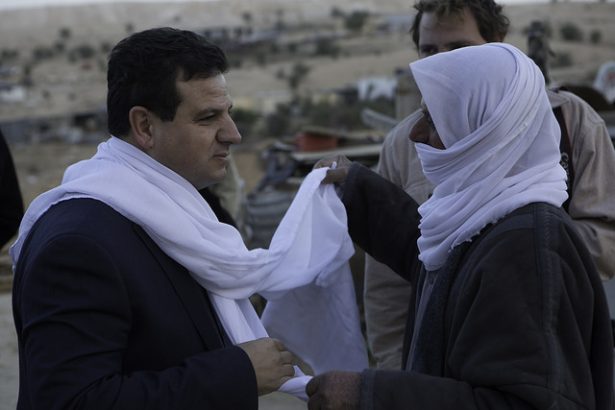
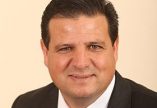
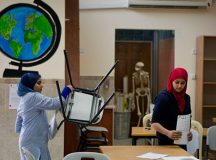
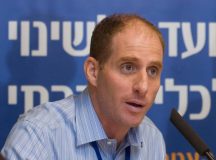
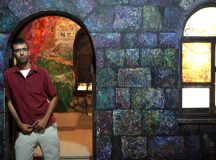
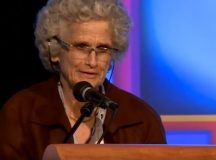































What a puffball interview. Why didn’t you ask him about the MK member of his party who was recently jailed for smuggling cell phones to Hamas terrorists in Israeli jails? You should try listening to some of his speeches in Arabic. He sounds a lot different.
Far from being a civilised “visionary” Aymen Odeh is a bigot who rejects Israel’s legitimacy but is better able to dissemble than many of the other representatives of Israel’s anti-Zionist parties. See my article http://blogs.timesofisrael.com/promoting-de-legitimisers-of-israel-or-the-new-adventures-of-rabbi-jacobs-in-hypocritical-progressive-land/
Support should be given to Arab Israelis who not only accept Israel’s right to exist and flourish but who courageously defend Israel in public.
His most recent activities include this – http://www.jewishpress.com/news/israel/israeli-arabs/report-arab-mks-pressuring-druze-youth-to-dodge-idf-draft/2017/06/20/